Category → Craziness with tools
Channeling my inner roofing contractor
Back in October we had some trees come down in Hurricane Sandy:



We recently had the tree removed from our house (there was quite a waiting list for removal services). I had checked our attic and found a bit of leaking, so I called a roofing company that could re-roof the damaged face for a mere $3200. After doing a bit of research, I decided to replace the damaged shingles myself. The new shingles are a slightly different color, but it all went together well in the end. Since I was two stories above the ground, I used a friend’s climbing harness and rope. Safety first!

I also used a mallet to bend the gutters back into shape. Despite the cool weather, it was quite warm up on the roof. I wouldn’t want that job in July!
Directional cell antenna for the RV
Our RV came with a TV antenna that can be raised, lowered, and rotated (demo video). I removed the TV antenna and installed a directional cell antenna:



The antenna connects to a 12V booster in the RV which has a flat antenna that phone is placed on. Using the phone’s signal meter, it looks like I’m getting a 40db gain relative to the phone’s internal antenna. This should help us stay in touch even when we’re out in the middle of nowhere.
Making an audio book
I purchased this book, but don’t really have time to read it, so I cut the binding off with my jig saw:

I then put the loose sheets into my ScanSnap 1300 scanner. In 15 minutes I had a 250 page pdf. Using a PDF to TTS app on the Android phone, I’ve turned this physical book into an audio book. It works great!
Folding bed for Mechel
I based the design on the Moddi bed, whose photos I saw online. We did this so his room could be used by the school during the day.
It’s an IKEA bed frame with 8 IKEA table tips bolted to the bottom to give it a modern art look.
The weight is shared between the wall cables and the ladder that supports the bed when it’s down:

When it’s up, it looks like an art piece:


The new RV
Our trusty Trailmanor has served us well since early 2009, but the layout has its limitations:

My parents bought this unit for themselves, and for two people, it’s perfect. Mechel and Baila sleep on the converted dinette, so when they go to bed, there’s nowhere for us to sit.
Since we now have the Sorento, which can tow 5000 pounds, we decided to purchase a conventional travel trailer. We wanted a bunkhouse model, and settled on the Forest River Wildwood X-Lite 26BH:


It weighs 4300 pounds, about 1100 pounds more than the Trailmanor. Many other manufacturers produce the same floor plan, but the X-Lite is 300-500 pounds lighter, thanks to its stamped frame and other innovations:

I drove out to Lakeview, Ohio to pick up the unit over Labor Day weekend. The drive back made me really appreciate the TrailManor’s towing characteristics. This one doesn’t fold down, so it is much more affected by crosswinds and passing semis. I installed anti-sway friction bars at the dealership, and that did seem to help quite a bit.
I’ve already installed a digital thermostat, and moved the pre-charged pressure tanks over from the TrailManor. Since there’s no folding now, I didn’t use the Banjo removable connectors and a flexible hose. Instead I used PEX and hard-plumbed the tanks in under the sofa.
Here are photos of our unit:































Know anyone who wants a 2007 TrailManor 2720SD? Ours is now for sale.
We’re going up to Mongaup Pond this weekend, we’ll see how it goes!
New wheels for the RV
To make sure we didn’t have any more blowouts on the RV, I wanted to transition to a higher weight capacity tire. Unfortunately, they’re not readily available on a 14” wheel, so I decided to upgrade to 15” wheels, which are standard on Trailmanors starting in 2009. The old and new wheels:
The new wheels wont fit in the wheel well, so I had to add spacers between the axle and chassis to increase the clearance. The spacer is the darker piece of square tubing in the center of the photograph:

I tack welded the axle to the spacer and the spacer to the chassis:

Once the spacers were installed, I was able to install the larger wheels. We now have a weight limit of 2560 pounds per tire, as opposed to 1700 pounds per tire with the 14” wheels.
In the process of hooking everything back up, I discovered that one of the brakes wasn’t working. I ordered new magnets, and when I took the hub apart, found that the wires had been broken by the strain relief clip.
Anyway, I replaced the magnet (the bar-of-soap sized thing below the axle hole). It was a real mess, but it gave me a chance to see how the brakes worked, which was interesting.
New lighting system for the bike
In 2003, I put together a lighting system for my recumbent (described in painful detail here):
In this setup, the two lights on the bike put out about 1250 lumens, and the headlamp puts out another 200 or so lumens.
Times have changed since 2003. There are now 900 lumen LED bike lights that are pretty inexpensive:
I bought a kit for $75ish that includes a battery, charger, and headlamp adapter. I ordered two more lights for $45 each, and a Y cable. Using the batteries mentioned in the 2003 link above, I fabricated a 2-cell battery pack for the unit that goes on the helmet, while the 4-cell battery pack that came with the kit powers the two heads on my handlebars via the Y cable.
So that’s 2700 lumens. It’s a bit brighter than most cars, and cars flash their high beams as they pass. The next step is to get a bar extender:

This will get the lights farther forward, so there’s no light reflecting off my silver brake cables into my eyes.
Welding!
I recently bought a Harbor Freight flux wire welder. Here I am fixing the snowblower:

(Insert maniacal laugh here)
Still more RV modifications
I made some modifications in anticipation of our upcoming trip. I modified the plumbing, replacing the water tank low point drain with a fixture that allows a garden-type hose to be attached. This allows the RV to be filled through the bottom, eliminating the need to open the RV so that the fill hole can be accessed. The white knob at the end is a plug to keep dirt from getting into the plumbing:

I also added switches that allow the solar panel to charge either battery, and the coach to run off of either battery:

The RV came with an oven, which we use for dairy, but I wanted to add a second oven for meat:

Removed the oven and cut out the cabinetry below. I didn’t notice the wheel well until this point. Grr!

New gas plumbing added:


The fitting that goes into the wall is a bulkhead adapter. The hose for the catalytic heater attaches on the far side.

I had to add risers to that the second oven could fit in above the wheel well:

Lower oven installed. I pulled off the range components.

To prevent the steam from the lower oven from entering the top oven, I built a duct out of sheet metal:

Duct installed:

Top oven installed:

Lower oven duct behind top oven. The lower oven is recessed by 1.5” to allow the duct to come up behind the top oven:

Here it is with the splash plate on. The splash plate and grill are removed before the RV is closed due to clearance issues:

Works great!
Sorento modifications
Since our Odyssey is no more, I had to make modifications to our newly-purchaed 2007 Kia Sorento to get it ready for towing.
I installed the same transmission cooler I had installed in the van. I hung it off the horn’s mount points:
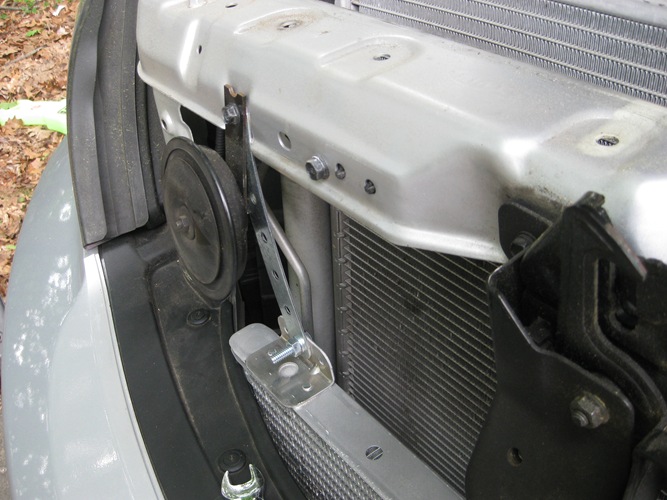
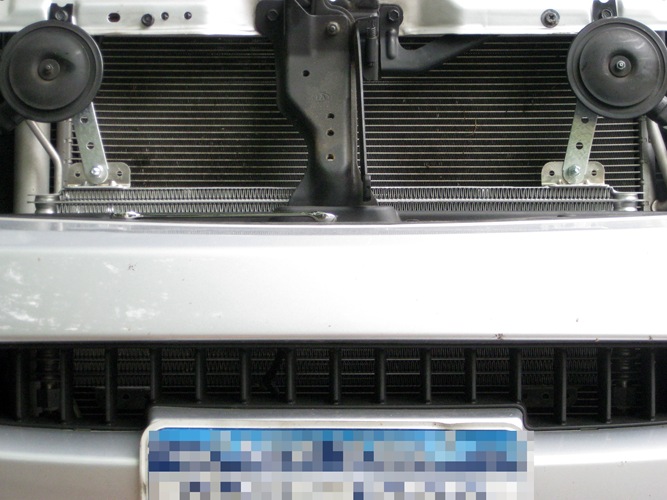
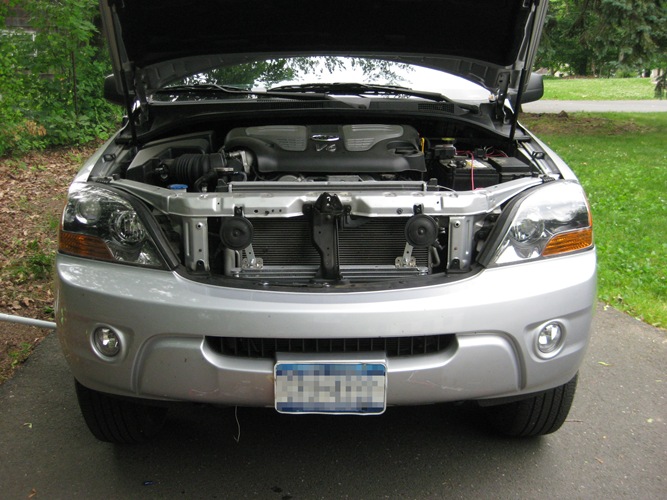
This picture was taken standing on the driver’s side. The two breakers for the charge line and the brake controller are on the left:
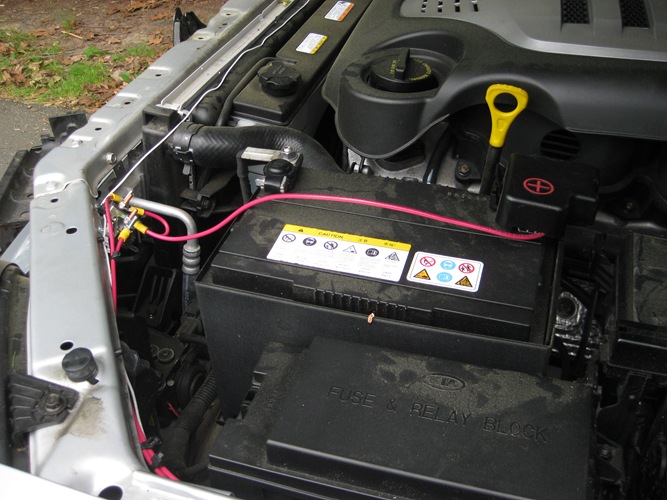
More wiring. Charge line, brake line, and power line for brake controller. The white wire is the signal wire for the transmission temperature gauge:
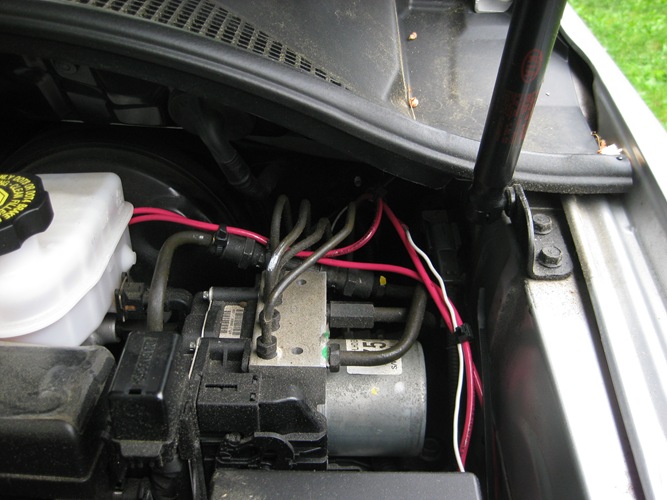
Installed a hitch and 7-way wiring harness. The Sorento has a modular connector that plugs into an adapter that provides turn and brake signals. I had to splice into the drivers side rear light cluster to get a reverse line. The brake control and charge lines came down from the engine compartment and run along the bottom of the chassis:
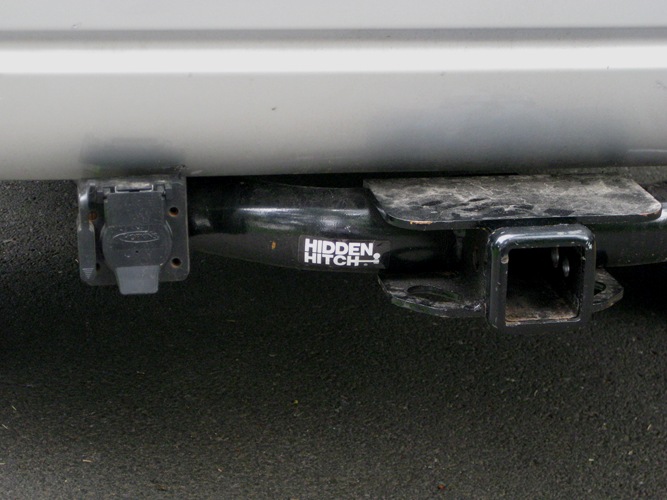
This picture is taken looking up under the car. The front of the Sorento is to the left. The red thing right of center is the inline transmission fluid temperature sensor. It’s mounted on the supply hose from the transmission. From there, the fluid is routed to the bottom-most hose (the one with the reddish coating), which is the supply line for the radiator’s transmission cooler. From there, the fluid is given to the factory cooler (the next hose up, with the black clip). The third from the bottom is the return from the factory transmission cooler, and it’s routed to the upper right hose on the temperature bypass (the blue thing – this is needed so that we don’t turn the transmission fluid to molasses in the winter). The fluid then leaves the upper left of the bypass, goes to the new transmission cooler, and returns via the lower left. The lower right connector then returns to the transmission.
After attaching the two left connectors, I realized I could get the hoses on much farther if I first coated the barb with a bit of transmission fluid as a lubricant. Oh well, it seems to be OK even though they’re not pushed on all the way.
The temperature sensor’s ground wire is attached by nylon cable tie to the surface of the sensor. It’s the white wire that goes to the bottom of the frame. Note the second cable tie for strain relief.
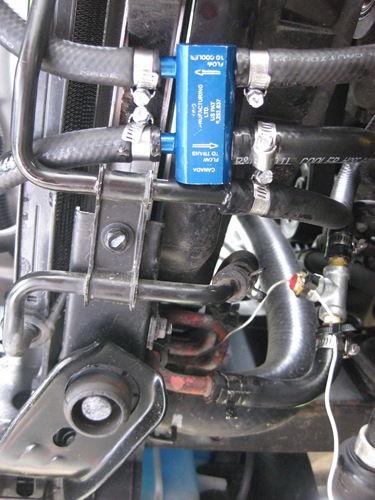
Here’s the temperate gauge mounted on the dash:

The brake controller, mounted to the change tray:
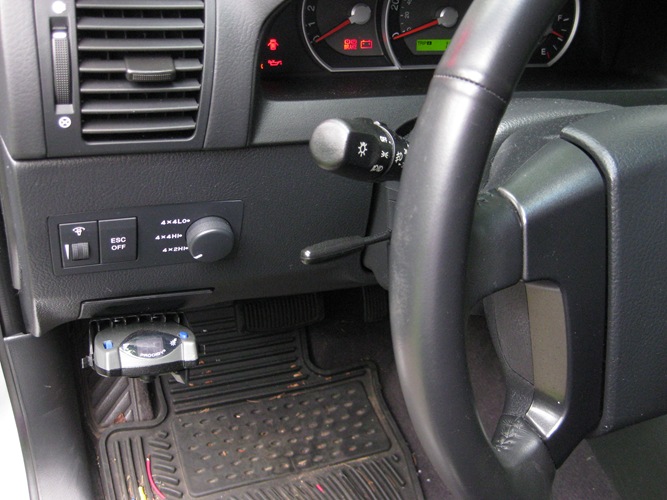
It’s a ton of work! I hope we have this vehicle for a long time!

